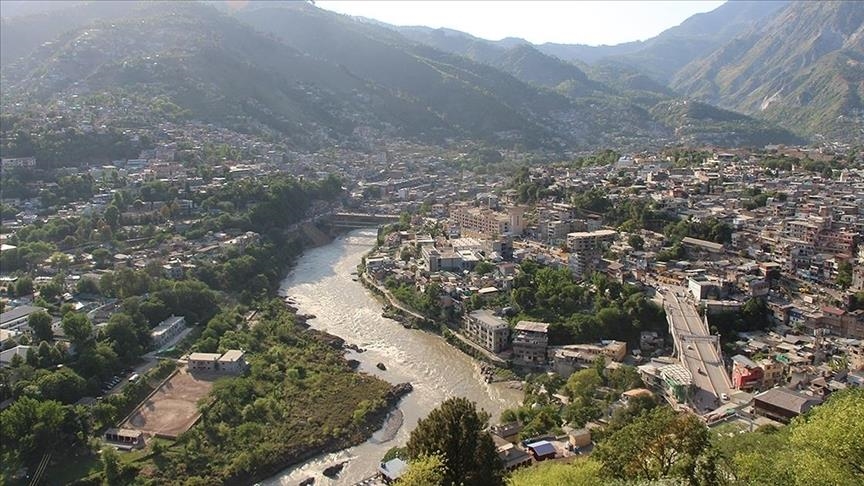By Staff Reporter
ISLAMABAD: Pakistan on Monday pressed India to reinstate the Indus Waters Treaty, a decades-old pact ensuring water for 80 percent of Pakistani farms, following a key ruling from an international court that reaffirmed its authority over a festering dispute between the two nuclear-armed neighbors.
The call came days after the Permanent Court of Arbitration (PCA) issued a supplemental award on June 27, solidifying its jurisdiction in a case pitting Pakistan against India over the Kishenganga and Ratle hydroelectric projects along the shared Indus River system.
The treaty, brokered by the World Bank in 1960, governs the use of the Indus River and its tributaries, a lifeline for agriculture across Pakistan and a persistent flashpoint in the fraught relationship between New Delhi and Islamabad.
Under its terms, India controls the eastern rivers, while Pakistan relies on the western ones, where India can build run-of-the-river hydroelectric projects subject to strict design and operation rules—a provision Pakistan has long argued India exploits to its detriment.
Tensions flared in April when India announced it was placing the treaty in abeyance after a deadly attack in occupied Kashmir’s Pahalgam killed 26 people—an assault New Delhi blamed on Pakistan without presenting evidence. Pakistan swiftly denounced the move as an “act of war,” arguing that the treaty offers no mechanism for unilateral suspension.
Islamabad hinted at legal action, citing a breach of the 1969 Vienna Convention on the Law of Treaties, which governs international agreements.
The PCA’s latest ruling, known as a supplemental award under its rules, addressed India’s attempt to sideline the treaty. Such awards clarify unresolved issues like jurisdiction or treaty interpretation after an initial decision.
“In a supplemental award announced on 27 June 2025, the Court of Arbitration hearing the Pakistan-India dispute over Kishenganga and Ratle hydroelectric projects has found that its competence remains intact, and that it has a continuing responsibility to advance these proceedings in a timely, efficient, and fair manner,” Pakistan’s Foreign Office said in a statement on Monday.
The court explicitly rejected India’s suspension, noting that the treaty “does not provide for the unilateral ‘abeyance’ or ‘suspension’” and remains in force unless both nations agree to terminate it.
“The Court found that the terms of the Treaty, read in light of its object and purpose, do not allow either Party, acting unilaterally, to hold in abeyance or suspend an ongoing dispute settlement process,” a PCA press release stated, warning that such a move would undermine the treaty’s compulsory third-party resolution framework.
Pakistan hailed the decision as a vindication. “The award vindicates Pakistan’s position that the Indus Waters Treaty remains valid and operational, and that India has no right to take a unilateral action about it,” the Foreign Office said. “We urge India to immediately resume the normal functioning of the Indus Waters Treaty, and fulfil its treaty obligations, wholly and faithfully.”
The government also expressed optimism about the PCA’s forthcoming ruling on the case’s merits, expected after hearings held in July 2024 at the Peace Palace in The Hague.
India, however, doubled down on its defiance. The Ministry of External Affairs “categorically rejected” the PCA’s award and refused to recognise the court itself, according to the Indian newspaper The Hindu.
“India has never recognised the existence in law of this so-called Court of Arbitration, and India’s position has all along been that the constitution of this so-called arbitral body is in itself a serious breach of the Indus Waters Treaty,” the ministry said.
It called the court’s actions a “charade at Pakistan’s behest” and tied its suspension of the treaty to broader grievances, asserting that it acted within “its rights as a sovereign nation under international law” until Pakistan halts alleged support for cross-border terrorism.
The standoff is the latest chapter in a decades-long saga over the Indus waters, which have fueled both cooperation and conflict since the treaty’s signing. Pakistan has repeatedly objected to India’s hydroelectric projects, fearing they could throttle downstream flows critical to its irrigated agriculture.
The current dispute traces back to August 2016, when Pakistan initiated arbitration over the Kishenganga and Ratle projects. A unanimous PCA ruling in July 2023 affirmed its competence despite India’s objections, setting the stage for this month’s supplemental award.
The diplomatic rift deepened after the April attack in Kashmir, which sparked a four-day military clash in May, the most intense skirmish between the two since their last major confrontation. Tit-for-tat measures followed, with India’s treaty suspension marking a sharp escalation.
Pakistan’s government has since stressed dialogue as the way forward, echoing Prime Minister Shehbaz Sharif’s recent pledge. “Pakistan is ready to engage in a meaningful dialogue with India on all outstanding issues, including Jammu and Kashmir, water, trade and terrorism.”
Copyright © 2021 Independent Pakistan | All rights reserved




